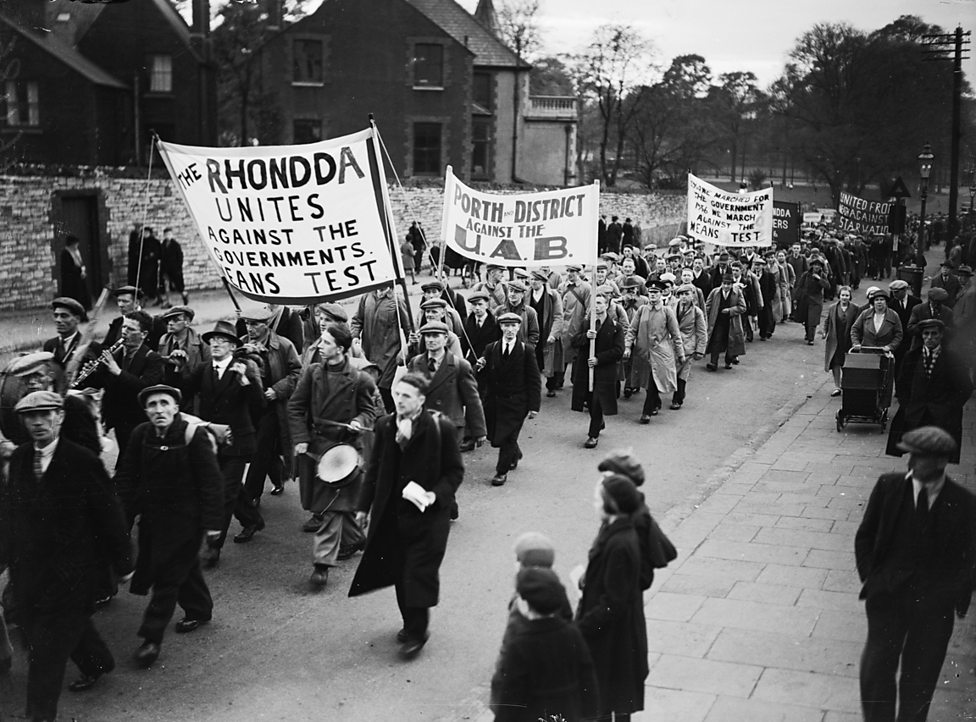Blue Plaque for ‘trailblazer’ Welsh woman who led demonstrations against the Means Test

Stephen Price
A blue plaque is being unveiled to honour Ceridwen Brown, who led an attack on Merthyr Tydfil Unemployed Assistance Board office during protests against the Means Test in 1935.
An active campaigner from the early 1920s, Ceridwen Brown was involved in the Women’s Co-operative Guild, the anti-war and pro-peace movements, anti-austerity and anti-poverty action, and other forms of grassroots community organisation.
Brown was the first woman ever to be nominated as a parliamentary candidate for the Aberdare constituency, nominated in both 1929 and 1931. She also took part in the Hunger Marches and raised money to support the Republican Government during the Spanish Civil War.
Local MP Beth Winter will unveil the plaque, following a talk from historian Daryl Leeworthy.
Ceridwen
Ceridwen Brown led an army of women to Merthyr Tydfil Unemployed Assistance Board (UAB) offices, burning papers and smashing telephones despite pleas from the local Labour MP on 4 February 1935.
At the time, mass protests erupted across the south Wales valleys where 300,000 people across the area of the Welsh Coalfield had marched.
This insurrection followed the 1929 crash and an ensuing slump which had a profound impact on industrial areas in south Wales. The steel works along the heads of the valleys closed, as did most coal mines.
Benefit cuts
At the time, nearby Brynmawr claimed an appalling record of 90% of insured men on the dole. Merthyr Tydfil had such little money to run its services that it was proposed to remove its borough status.
A ‘National Government’ comprising Conservatives, Liberals and some right-wing members of the Labour Party, came to power in 1931 with a huge majority. Their first move was to cut Unemployment Benefit by 8% and tighten up ‘means testing’ for benefits.
Anyone out of work for more than six months could have their ‘assets’ examined by inspectors who had the right to enter homes. Not only ‘luxuries’ such as cooking pots were considered but also the earnings of anyone else who lived in the house.
In order to survive, families relied on Public Assistance Committees (PACs) which were financed and run by local councils – said to be a form of “taxing the poor to pay for the poor”.
These committees had to use the hated means test but were under the control of local councillors who were often unemployed themselves.
PACs in south Wales refused to employ the means test rigorously and ‘anomalies’ were exploited. Nevertheless, 15% of children in the Rhondda were malnourished according to a 1935 report.
The cuts did not appease City investors. Local PACs were regarded as ‘too generous’ and the Unemployment Benefit Act 1934 aimed to set up statutory Unemployed Assistance Boards which would have no leeway for ‘generosity’. It was this final blow that sparked the huge demonstrations of 1935.
Climb-down
On 5 February, the day after the Welsh pushback, the British government announced that implementation of the measures would be put off for a year and a half and much modified.
This was one of only a handful of cases where popular movements (supported by parliamentary protests led by Aneurin Bevan, MP for Ebbw Vale) caused a government climb-down.
Ceridwen Brown’s part in this mass movement and the Welsh public’s defiance marked the breaking point of a growing wave of organised people’s protest.

After the Second World War, Ceridwen Brown moved into peace campaigning and fundraising for the fight against cancer – a disease which claimed two of her three children.
Legacy
Ceridwen Brown died in 1976, at the age of 79 – a remarkable age for someone who had spent almost her entire adult life at or below the poverty line.
Her legacy remains that of encouraging women, in particular, into public life, and providing the tools for them to do so.
The Aberdare Leader captured one of her speeches in 1950, where she said: “there needs to be more support [given] to women to take a more active interest in public affairs.” It was to this purpose that she devoted her life.
Geoff Jones, from the Socialist Party, wrote: “Even in those days, the Labour Party, which then claimed the allegiance of most workers, refused to support direct action.
“Labour MP, SO Davies described the Merthyr demonstrators as ‘scum’. In south Wales the lead was taken by the Communist Party and the Independent Labour Party (a left-wing group which broke from the Labour Party in 1932) in the National Unemployed Workers Movement.
“These parties had many failings but they were prepared to lead the workers’ fight.”
The public are invited to attend the unveiling of the plaque, which will take place on Friday 8 March at 2pm, at St Elvans, Aberdare, with the plaque later to be moved to Regent Street in Aberaman.
Support our Nation today
For the price of a cup of coffee a month you can help us create an independent, not-for-profit, national news service for the people of Wales, by the people of Wales.





